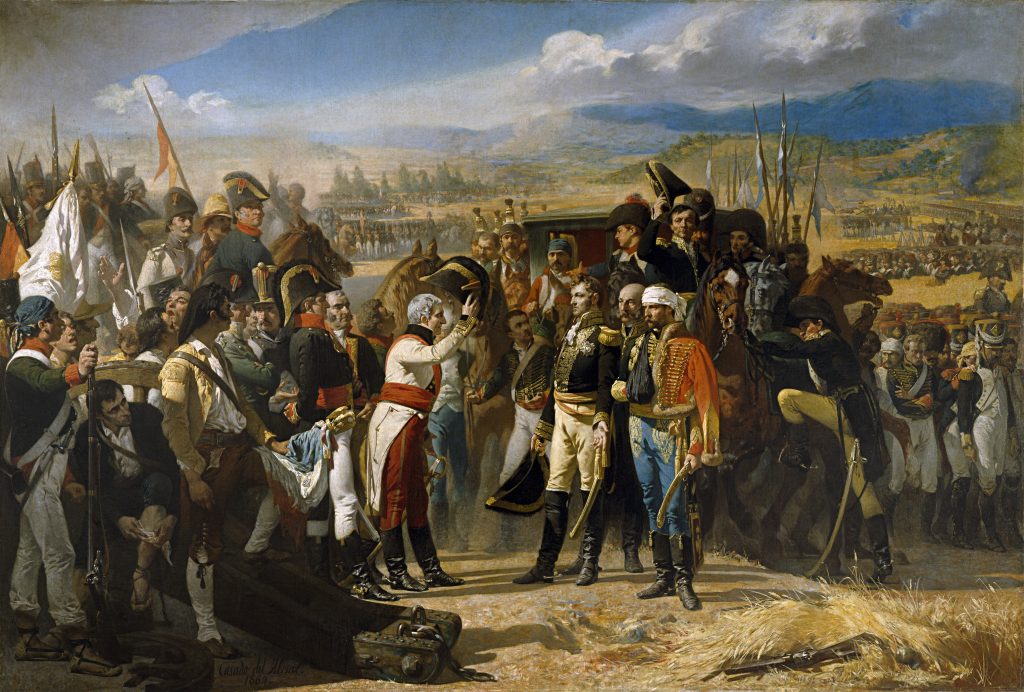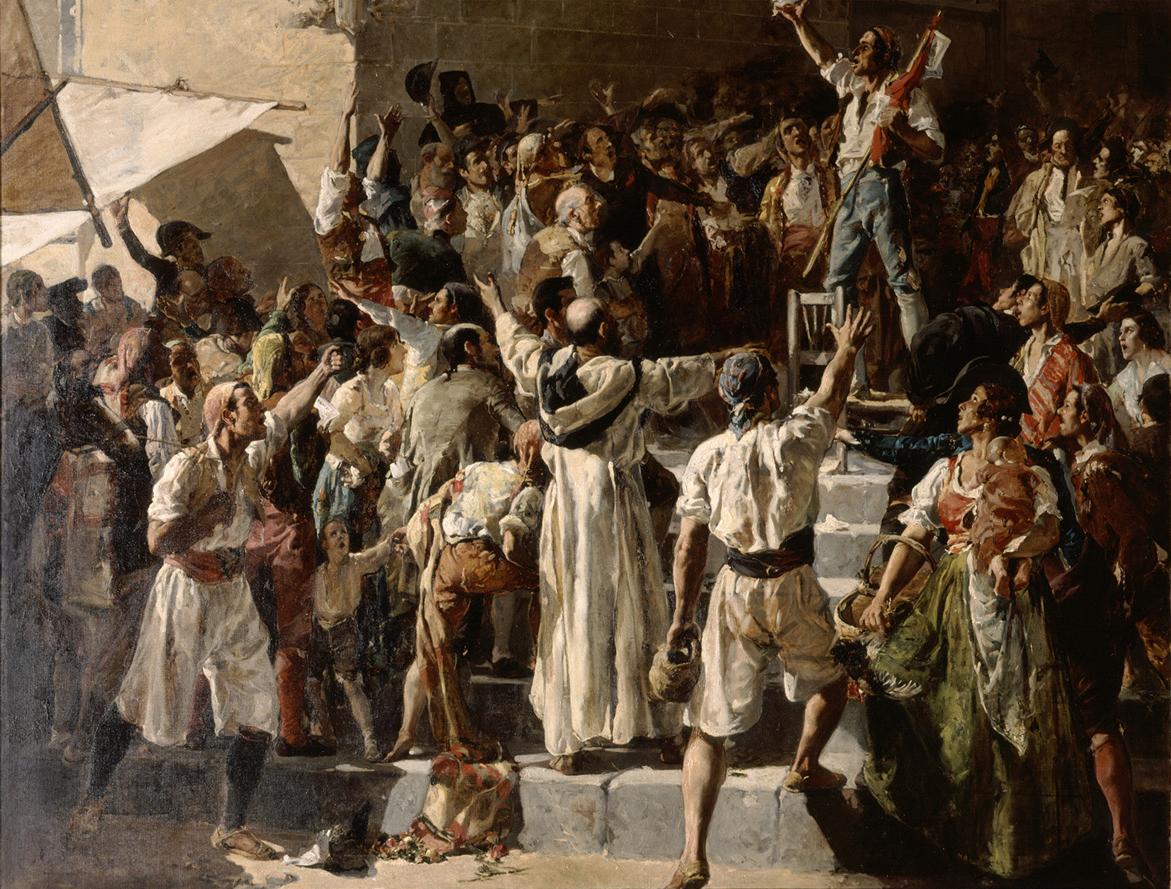
Valencians prepare to resist the invaders by Joaquín Sorolla, 1884
Unexpected setbacks to Napoleon’s plan to control Spain at the onset of the Peninsular War (1808–1814) required the emperor to launch a 270,000-man counteroffensive into the heart of the country in late 1808 – culminating with the British defeat at the Battle of Corunna, January 16, 1809. The plan to retake control of the heart of Spain centered around the city of Tudela, south of Pamplona, which Napoleon believed would act as a hub from which operations could be directed to ensure a viable logistics route connecting the French border city of Bayonne with Madrid. In the Plan for the Reorganization of the Army of Spain, Napoleon wrote, “Tudela then must be occupied.”
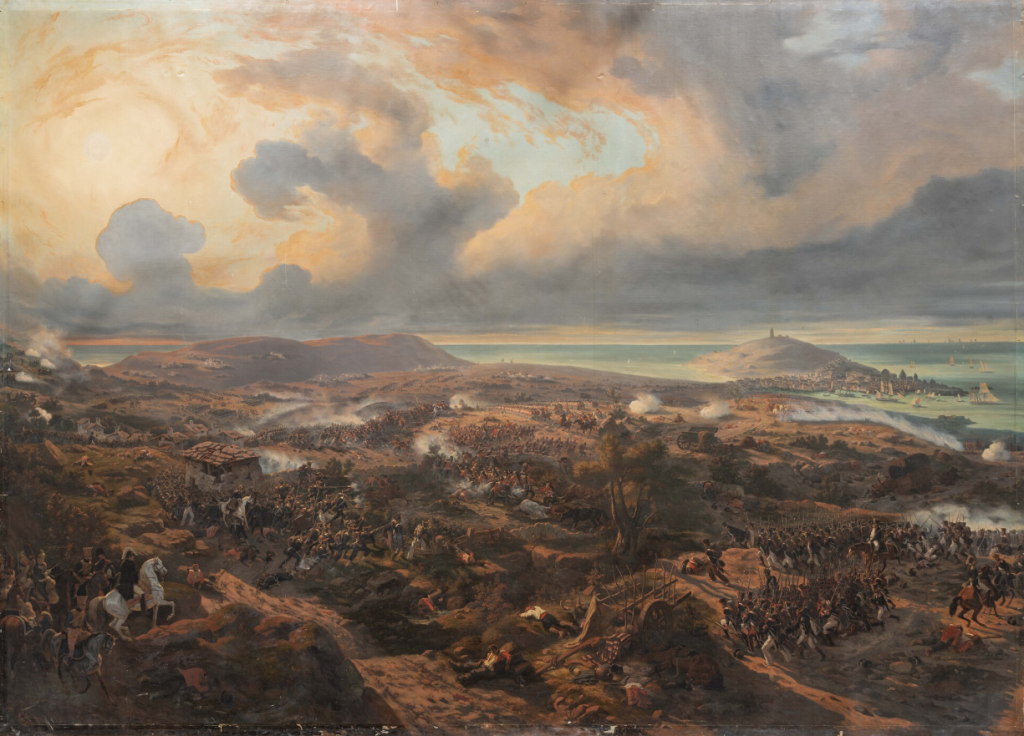
In addition, Napoleon outlined his desire that Marshal Ney protect his brother Joseph, who was recently installed as king. In his words, “Marshal Ney’s corps of the center and the corps round the King.” This was welcome news to Joseph, who was waiting for the Grand Army to appear at Miranda de Ebro to re-cross it and retake Madrid. With the news of added attention to his plight from Napoleon, Joseph mustered the courage to hatch a plan of his own, which involved an assault on the capital with the 50,000 men. “I could disperse the enemy and reach Madrid, where the government which they are trying to create would disperse of itself.” Invoking the “art of war,” Napoleon immediately deeming the plan foolhardy:
The art of war is founded on principles which must not be violated. To change one’s line of operation is an operation which only a man of genius ought to attempt. To lose one’s line of operations is an operation so dangerous that to be guilty of it is a crime. To preserve it is necessary in order to avoid being separated from one’s depot, which is the point of rendezvous, the magazine of supplies, and the place to which one’s prisoners, wounded, and sick are to the sent. […] But at this instance to rush into the interior of Spain, without any organized center or magazines, with hostile armies on one’s flanks and in one’s rear, would be an attempt without precedent in the history of the world… This scheme, opposed as it is to all the rules of war, must be given up.[1]
Moreover, and more important to the ultimate defeat of the French Army in Spain, Napoleon outlined the major factor of his undoing – that of underestimating the insurgent movement coalescing in Spain:
The line of communication is not lost because it is disturbed by guerrillas, by insurgent peasants, and in general by that which is called a war of partisans. A few detached men will always force their way, whatever course this takes; such enemies may stop couriers, but are not capable of making a stand against a van or rear guard… There is a great difference between operations with a well-considered system from an organized center, and proceeding at hazard without such a center, and risking the loss of one’s communications.[2]
The counteroffensive campaign in Spain and the micromanaging of the army was carried out by Napoleon himself. After meeting the Russian Tsar in Erfurt, he informed Joseph he was on his way to Bayonne, employing the legendary optimism that often made him victorious: “A well-arranged maneuver might terminate the war by a single blow; and for this my presence is necessary.”[3] A month later, he lambasted Joseph for the lack of reliable military intelligence and his Director of the Administration of War, Jean Dejean, for the ill-equipped army amassing in that city. “My army will begin the campaign naked, it has nothing. The conscripts are not clothed. Your reports are waste paper.” He also complained that his orders were not being followed, that the “Commissary cannot be relied upon,” and that many of the army suppliers were “rogues.” He also added some advice for Dejean, who was apparently having difficulties acquiring the proper uniforms needed for the coming winter campaign. “Act on this principle, that every contractor is a thief.”[4]
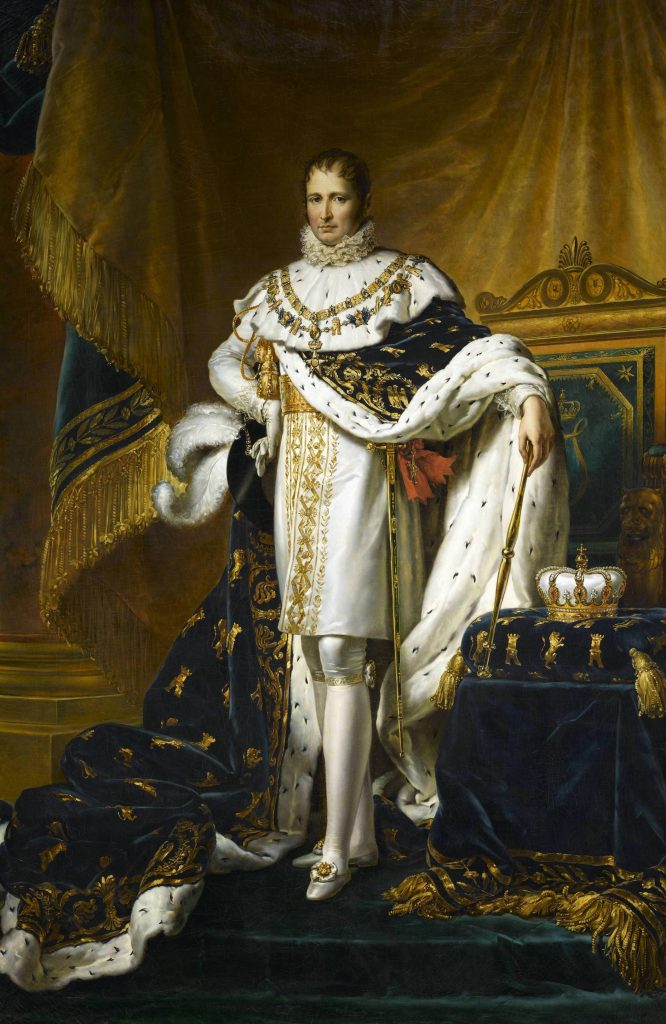
French Army Logistics
That Napoleon would refer to military contractors as thieves is not surprising. In his seminal work, Swords Around the Throne: Napoleon’s Grande Armée, historian and U.S. Army officer John R. Elting notes that contactors “had a practically universal reputation for theft, embezzlement, cowardice, and any other available sin.” Serving as a logistics service during wartime for the purpose of making money, contractors generally worked behind the main lines and “naturally drew men who had no liking for danger or physical discomfort and therefore were unlikely to be useful in a crisis.” In essence, contractors were more opportunists than warriors.[5]
Yet, supply contractors were critical for the survival of the army, especially in occupied territory where the army could expect less than forthcoming assistance from the local population. Directed by the Intendent General, the logistics services included “all types of skilled and unskilled workmen – masons, bakers, drovers, butchers, teamsters, blacksmiths, wheelwrights, laundresses, and laborers.”In sum, Napoleon not only had a difficult time funding his soldiers, but he also needed to employ a logistics network for each major campaign akin to the size of a large village. In an era before warfare logistics integration, the massive effort of supplying large armies required intense coordination between the civilian contractors and Intendent General in order for it to run as smoothly as possible.[6]
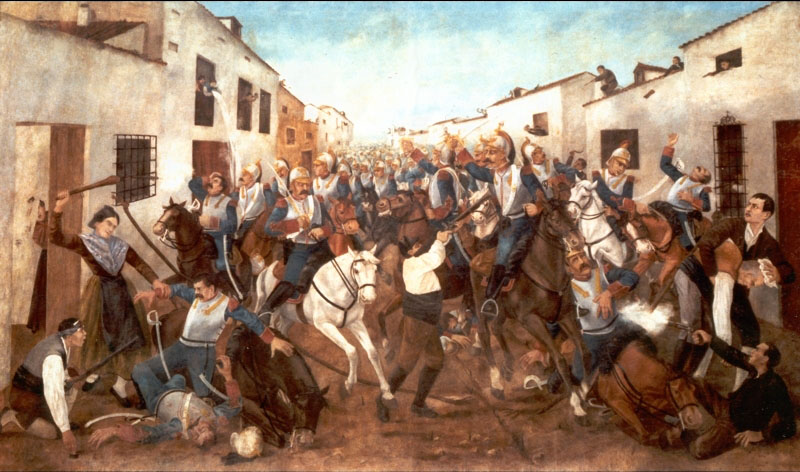
The “Intendance proper had five principle ‘Services.’” These were made up of bread suppliers (Vivres-pain), meat suppliers (Vivres-viande), hay, straw, and grain suppliers (Fourrages), candle and fuel suppliers (Chauffage), and clothing suppliers (Habillement). Each sector of the logistics network served an essential role in keeping the army supplied. Elting notes that the oven-builders associated with supplying bread “were key personal and were very much aware of it.” In general warfare “detachments of oven-builders and bakers often were sent ahead of the troops, to have bread ready” for arriving soldiers.[7] Since much of this system broke down in a country that would later be teeming with hostile guerrillas looking for easy targets, it became suicidal to send French bakers into unsecured areas.
Other services were also important to maintaining the army’s ability to wage war outside of France. Fourrages who supplied hay, straw, and grain for the horses needed to haul cannon and wagons on difficult roads, were notoriously lacking in Spain. “As a rough example, it took fifty wagons to move forage for some 2,500 horses for two days.” The problem of keeping horses and other draft animals was acutely severe in Spain, where dry weather during much of the year limited the amount of local crop needed to keep animals well-fed. When the Fourrages were nowhere near a theatre of operation, cavalry often “had to feed their horses on what they could find: green grain, twigs and leaves, or dirty straw from the thatch of peasants’ roofs.”[8] Later on, as the war progressed, maintaining horses in Spain would become a much larger problem.
Corrupt Intendance system
Elting writes that the Intendance system was inherently corrupt, full of self-serving actors, and graft – despite Napoleon’s best efforts “to enforce a certain minimal degree of honesty.” As noted, the integrity of the contractors and their loyalty to the French cause generally only extended as far as their personal safety was concerned, and in “times of defeat or retreat Intendance personnel could be relied on to save themselves and any portable ill-gotten gains they could carry with them.” In Spain, even the best logistics network would have been stretched to it limits. “The lower grades of the Intendance staff sent there in 1808 were hastily selected and often unqualified. But Spain was a dangerous place with few safe rear areas; they lost heavily, usually to guerrillas while searching for supplies. Of necessity, they learned to work closely with combat troops” and were often required to be armed like soldiers in order to ensure a minimal chance of defending themselves. Elting writes:
Napoleon was never able to break away from partial dependence on them, simply for the reason that the services they rendered (or at least were paid to render) were essential. In their crude fashion they discharged a large share of the work handled by today by the U.S. Army’s medical, quartermaster, and transportation corps. Napoleon realized that such functions could be more efficiently discharged by military organizations and did gradually militarize some of them, but the sheer size of the problem, the lack of suitably trained and experienced officers, and the constant wars which consumed his time all made the task impossible to complete.
As the war worsened for the occupiers, and the guerrillas became stronger, the risk-to-benefit ratio for many contractors operation in Spain no longer became tenable. Since many of them were not French (Dutch, German, Italian, etc.), and their primary motivation was making money, many of them simply could not be convinced to work in a land so hostile to the occupation army. As for the Spanish contractors, many of them had to leave with the retreating army in 1813 and 1814 – “…hating the French but fearing their vengeful fellow countrymen even more.”[9]
[1] Napoleon Bonaparte, The Confidential Correspondence of Napoleon Bonaparte with His Brother Joseph, Sometime King of Spain, vol. 1 (New York: D. Appleton and Company, 1856), 354, 359-363. Sept. 9, 1808; Joseph to Napoleon, Sept. 14, 1808. Napoleon to Joseph Sept. 16, 1808. Napoleon reiterated his previous plan pivoting on Tudela, Pamplona, and Burgos. “But all these battles must be fought according to the rules of war, that is to say, with the lines of operations secure… The position of the Ebro and the important débouché [passage] of Burgos are tenable only while Tudela is occupied.”
[2] Ibid. 364-5. Napoleon to Joseph Sept. 16, 1808. See: Benjamin J. Swenson, The Dawn of Guerrilla Warfare: Why the Tactics of Insurgents against Napoleon failed in the US Mexican War (Barnsley, UK: Pen and Sword, 2023).
[3] Ibid. 365. Napoleon to Joseph, October. 13, 1808. See: Michael Ross, The Reluctant King: Joseph Bonaparte: King of the Two Sicilies and Spain (Sidgwick & Jackson, London, 1976), 163. “Napoleon had no intention of allowing his brother to take any active part in the direction of the campaign.”
[4] Ibid. 366-370. Napoleon to Joseph, Oct. 19, 1808; Napoleon to Dejaen, Nov. 4, 5, (1808).
[5] John Elting, Swords Around the Throne: Napoleon’s Grande Armée (London: Phoenix Giant, 1989. Reprint, 1997), 555, 535.
[6] Ibid. 553
[7] Ibid. 553-4. Elting writes: “The baking might be done by local bakeries or in army ovens. A crew of four master masons and four assistants could build a standard army oven in twelve or fourteen hours. Two more hours were required for the mortar to dry; then the bakery crews would take over. The bakers (boulangers de munition) were organized in ‘brigades’ of four men each: three ‘kneaders’ and one ‘brigadier’ in charge of actual baking. The standard oven could produce five hundred bread rations at once, and, if the fuel supply was adequate, could handle five to six loads a day. Forty ovens could bread for 100,000 men.” (Ibid. 554)
[8] Ibid. 554. Elting also notes that, due to bad roads, “in many sections pack mules were the most reliable means of transportation. (Ibid. 509)
[9] Ibid. 555-8.
About the author
Based in South Korea since 2008, Benjamin J. Swenson is a professor at Hoseo University in Asan. He holds a PhD from Pompeu Fabra University in Barcelona, Spain, where his dissertation addressed 19th-century Euro-American military history. His work has appeared in the Journal of Military History, and his most recent, The Dawn of Guerrilla Warfare (2023), was published by Pen & Sword. Its follow up, Wars of the Mexican Gulf, will be published in 2024. His hobbies include Viking sagas and chess.
